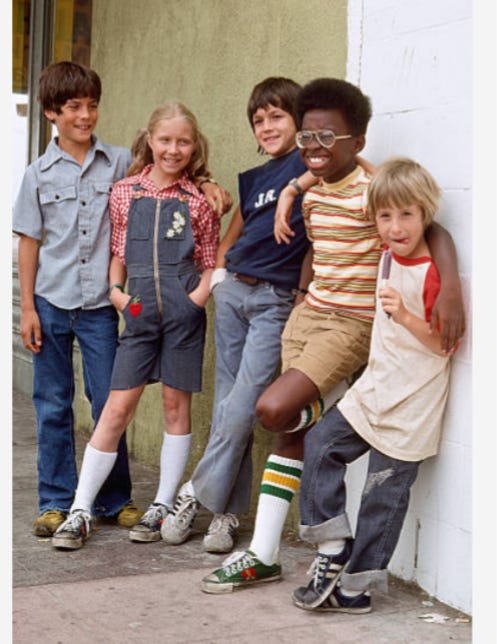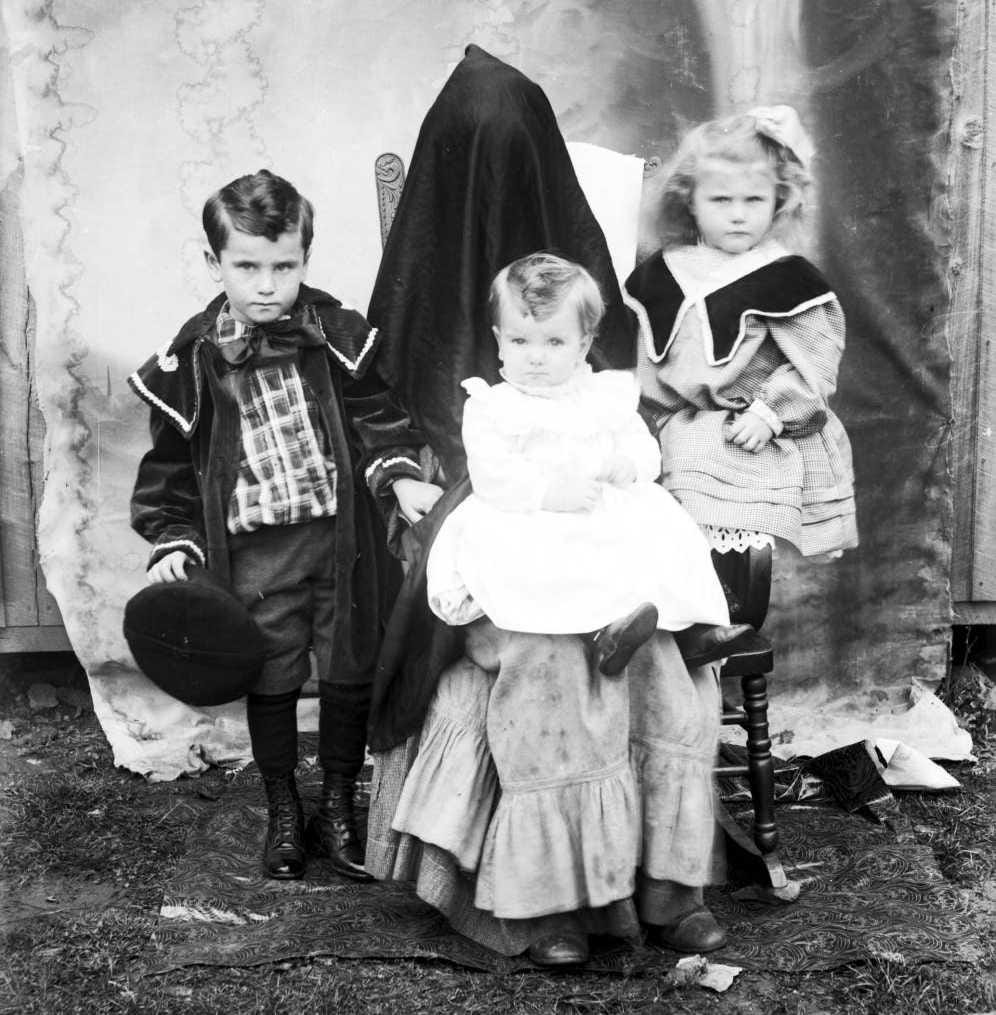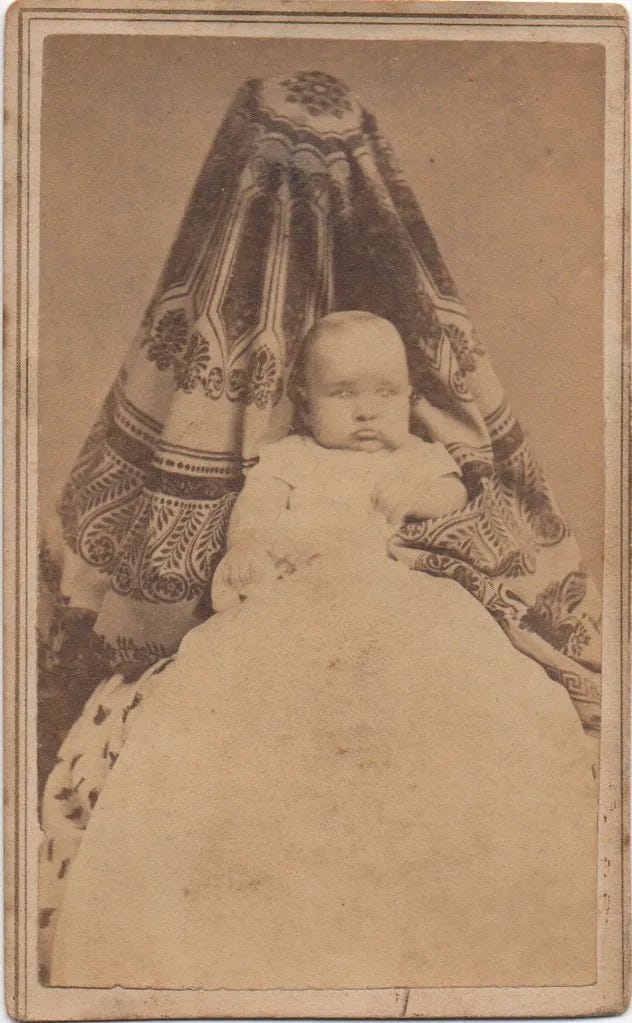OK I admit it - over the past two days I’ve spent more time that I perhaps should have done reading wild theories about the true whereabouts of Kate Middleton, zooming in on ‘that’ Mother’s Day family portrait to see which bit of the sleeve didn’t match up, and deciding if her face really was superimposed from last year’s photoshoot for Tatler. I know, I know, I should know better, but I just have this insatiable need to play the amateur sleuth that I’m determined to frame as a positive quality even if you don’t. I blame Enid Blyton basically. And the Red Hand Gang.


Also, I do actually care how she is. She’s a mum of three, and although that’s about where our similarities begin and end, I hope she is ok. I am invested, somehow, in her wellbeing.
As I compulsively zoomed in on her family photo, the surrounding controversy about doctored images and absent mothers reminded me of something arguably even more fascinating, a set of images from the Victorian era known as the Hidden Mother photos. Before I explain to you what they are, I will share a few for you to look at.
As bizarre as these images may look to us today, this was apparently a common technique used in an era when photos required long exposure times - longer than a wriggly baby could sit still for. But the need for a firm pair of hands to hold the baby still doesn’t explain why the mother was so clumsily covered up with a pair of old curtains, does it? One theory is that, because infant mortality was so high at the time - and in this era posthumous photos of babies were also popular - parents actually wanted the hidden mother to look obvious, because her presence under the sheet signified that this particular child was still alive and kicking. There’s something quite eerie, though, about the way the mother is not considered worthy of showing her own face in the photograph, but instead becomes passive and faceless; her humanity erased.
These images struck me powerfully when I first saw them some time around 2011, as they did the rounds on what was then the place to be on social media - Facebook. At the time, I was overwhelmed with a toddler and a baby, and without wishing to or intending to, I felt I had somehow completely disappeared from my own life - or at least, from the life and the identity I had known up until that point. Like the women in the portraits, I was still quite obviously ‘there’, but my purpose was functional, utilitarian; a new life of service. In spite of my presence, I was at the same time invisible - in fact no, I wasn’t invisible, but motherhood somehow seemed to act as a signifier to treat me as if I were invisible, to pretend that I was; to truly objectify me, not in the old fashioned, fuckable way I was used to, but by instead treating me as a comfortable and reliable part of the furniture. All of this was voluntary of course: I had willingly placed the cloth over my own head. And as the women in the Hidden Mother portraits must have done, I felt in the dark, lost, and at times, stifled.
Part of the struggle of motherhood lies in these feelings of being taken for granted, invisible and unacknowledged. Mother’s Day, which in the UK we celebrated last Sunday and for which the Duchess of Cambridge shared her mysteriously photoshopped portrait, steps up to fill this void. You can call it a commercialised load of old cobblers if you like but for me I think it’s hands down my favourite special occasion of the year. With zero prompting, my three gorgeous children create the most lovely handmade cards and gifts and then absolutely delight in bringing them to me in a triumphant procession along with breakfast in bed. On Sunday they all sat around chatting to me while I ate, and I could have eaten them all up too with their beautiful shining faces. It was magic. And I felt truly visible and truly loved. Everything suddenly deeply made sense in those twenty or thirty brief minutes.
Whilst we did not ask for it, the world is currently demanding that we analyse and explain, “What is a woman?”, and “What is a mother?”. Enforced language changes, which I document painstakingly every week on another section of this substack, The Word is Woman, insist that we move to a more ‘gender neutral’ world, where everybody is a ‘family’, a ‘carer’ or a ‘parent’, rather than a mum. This insistence that there is nothing special about ‘mother’ and that anyone who cares for a child is equally valid and interchangeable has forced us to pause and ask if this is actually true, and to really put ‘mother’ under the microscope. When we do so, many reach the perhaps unsurprising conclusion that mothers are vital and special and irreplaceable. That you can’t hand over their job to Alexa or to the most excellent paid worker, and not really even - as brilliant as they are in their own way - to Dads. And that mother’s contribution to society is not just unique but bloody monumental.
Some argue that this is an old fashioned or conservative position to take, but those people are not usually mothers. And mothers get to vote. On Friday in Ireland a referendum took place to make two amendments to the constitution. I won’t dive too deep into the politics (you can read about the choices voters faced here), but from an outsider’s perspective it seems like there were two key elements in the mix that felt very familiar to me as someone who watches the movements of gender ideology quite carefully - firstly an attempt to erase mothers and insist on a gender neutral world in that most un-neutral of areas, care work, and secondly, a supreme arrogance on behalf of politicians and Yes campaigners that most often comes from folk who have never wiped an arse in their lives.
Essentially in one of the amendments they wanted to remove the word ‘mother’ and ‘woman’ completely, instead describing those who care as ‘family members’. Arguably the current wording is a bit archaic. It is regressive to suggest that only women can care for children or run a home. It is even more regressive to suggest that women’s only role is to care for children or run a home - and although this is not what the current amendment does, some feel it is implied. But it is not regressive to acknowledge that many women do the majority of childcare or home management, to make that work visible, to show gratitude for it, elevate it and protect it. It’s not even regressive to say that for some women (not all) it’s a role they actively choose and take pride in. Step forward the women of Ireland to the polling booths, many of whom, whilst they would have welcomed amendments that acknowledged other people who do the work of caring, would not stand by and see mothers erased from the constitution.
The ‘No-No’ vote was overwhelming. 73.9% voted against the erasure of women and mothers from the constitution in the ‘care amendment’. In the ‘family amendment’, voters rejected a change of wording to include ‘durable relationships’ in addition to marriage. As is often the case when women, and particularly mothers, speak up and say no, there have been accusations of right wing or backward attitudes, or a rejection of inclusivity. But women have remained clear - this was not their reasoning. Their reasoning was that the changes were rushed and flawed, and that instead of adding, they took away. And they took away things of value: family, home, women, mothers, and the contribution of all of this to a good and loving world.
With the UK elections looming, I hope politicians are taking note. You cannot build a fairer more equal society by pretending that it’s already equal and fair. Women have a vote, and we and the huge contributions we make will not be overlooked or erased. The mothers care, and we’re coming soon to a polling booth near you.
More reading:
Geraldine Halpin on why women voted No.
Estelle Birdy on the ‘care amendment’ and motherhood.
I am able to write this substack solely because of the support of paid subscribers. If you are one, thank you! If not, please consider signing up, you’ll get all kind of marvellous perks and my eternal gratitude. If you can’t afford it, please do take out a free sub so you never miss a post.












There's something about those hidden mother portraits that really tugs at my heart. Maybe it's because I'm still struggling to find my identity as a newer mother (almost 17 months postpartum) and I sometimes feel like them, a dark void in the background. Being a mother is my favorite thing in the world and has been the single most transformative experience in my entire life. However, amidst the joys and challenges, I find myself unsure of where I truly fit in the world right now.
Thank you for this! I especially liked learning about the Hidden Mothers!! As feminists who champion women how can we not champion mothers?? This is a bone I’ve had to pick since the 1970s!!!